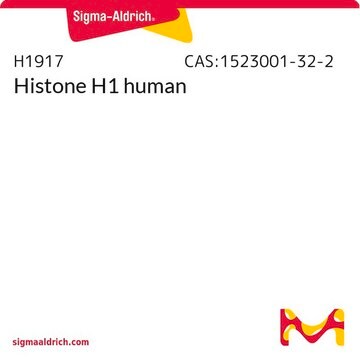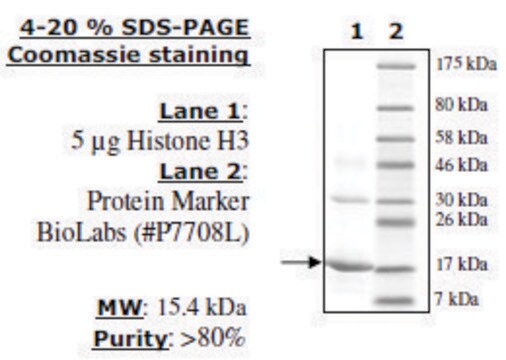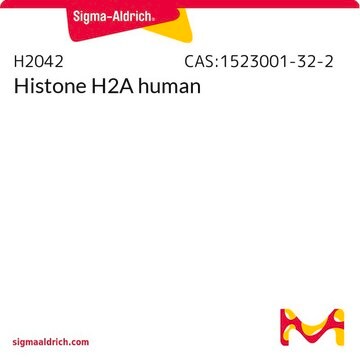H5505
Histone from calf thymus
Type III-S
About This Item
Produits recommandés
Source biologique
bovine (calf) thymus
Niveau de qualité
Type
Type III-S
Forme
powder
Concentration
≥60% protein (biuret)
Technique(s)
activity assay: suitable
Solubilité
H2O: soluble 10 mg/mL, clear to hazy, colorless to light yellow
Température de stockage
2-8°C
Vous recherchez des produits similaires ? Visite Guide de comparaison des produits
Application
- as a positive control in the in vitro kinase assay to examine the ability of Cdc2-cyclin B1 to phosphorylate GST-CD-4 protein
- in Cdk5 activity assay
- in histone H1 kinase assay
- as a Poly(ADP-ribose) (PAR) acceptor in the assessment of in vitro PAR polymerase activity
- as an acceptor of 32P from [γ-32P]ATP in order to measure protein kinase activity of lysate from small and large luteal cells
Actions biochimiques/physiologiques
Caractéristiques et avantages
Autres remarques
Notes préparatoires
Code de la classe de stockage
11 - Combustible Solids
Classe de danger pour l'eau (WGK)
WGK 3
Point d'éclair (°F)
Not applicable
Point d'éclair (°C)
Not applicable
Équipement de protection individuelle
Eyeshields, Gloves, type N95 (US)
Certificats d'analyse (COA)
Recherchez un Certificats d'analyse (COA) en saisissant le numéro de lot du produit. Les numéros de lot figurent sur l'étiquette du produit après les mots "Lot" ou "Batch".
Déjà en possession de ce produit ?
Retrouvez la documentation relative aux produits que vous avez récemment achetés dans la Bibliothèque de documents.
Les clients ont également consulté
Notre équipe de scientifiques dispose d'une expérience dans tous les secteurs de la recherche, notamment en sciences de la vie, science des matériaux, synthèse chimique, chromatographie, analyse et dans de nombreux autres domaines..
Contacter notre Service technique









